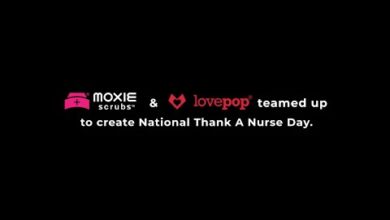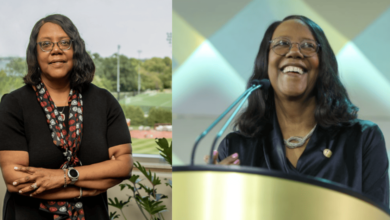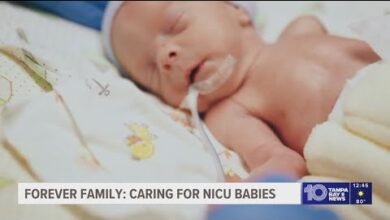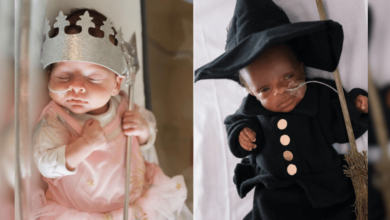Celebration held for first Dame Elizabeth Anionwu fellows

Five nurses and midwives who are championing equality, diversity and inclusion (EDI) in their organisations are the first to complete a brand new fellowship named after Dame Elizabeth Anionwu.
This week, the first cohort of fellows from the Dame Elizabeth Anionwu Fellowship Programme for Inclusivity in Nursing and Midwifery gathered to celebrate and share the projects they have launched at their trusts to promote EDI.
The fellowship, which is funded by NHS England Workforce Training and Education, formerly Health Education England, has been led by London Southbank University (LSBU).
The bespoke programme has supported nurses and midwives to lead changes which are aligned to the EDI agenda in their organisation.
Dame Elizabeth is an emeritus professor of nursing at the University of West London and was the first sickle cell specialist nurse in the UK.
She has been admired by many in nursing and midwifery for her commitment to improving health outcomes for minority ethnic communities.
At the fellowship celebration event, held by LSBU at the Royal College of Nurisng headquarters, the fellows presented their projects and progress that had been made so far.
Elaine Thorpe – senior matron in critical care at University College London Hospitals NHS Foundation Trust
Through the fellowship, Ms Thorpe produced and implemented a new appraisal form on her critical care unit which included questions that allowed staff to discuss their protected characteristics and lived experiences.
By doing this, Ms Thorpe said she hoped it would open a dialogue between line managers and staff around inclusivity and accessibility, as well as create a space for staff to raise any issues they may have.
It comes as previous staff surveys at the trust had revealed that some staff felt they could not speak to their line managers about their lived experiences, or discrimination they had faced.
Since implementing the new appraisal form on her unit, she explained that conversations around EDI had become more frequent.
Maria Rowntree – community midwife at Gloucestershire Hospitals NHS Foundation Trust
Ms Rowntree was inspired to join the fellowship because she wanted to improve maternity outcomes for non-English speaking women.
As part of the programme, she is set to be running a mandatory demonstration for all maternity staff at the trust to show them how they can help refer patients to interpreting services.
Meanwhile, Ms Rowntree has also created best practice guidelines to help midwifery staff make referrals, which she said all midwives will have access too.
She added she was looking to expand the project further, through exploring the possibility of including a QR code on all patient letters, posters, medicines and leaflets so patients are always able to access information in their own language.
Madhoor Ramdeen – lead clinical nurse specialist in irritable bowel disorder (IBD) at London North West University Healthcare
Ms Ramdeen wanted to focus her fellowship project on improving the provision of care for patients from South Asian backgrounds with IBD.
Even though the number of South Asian people with IBD, which includes Crohn’s disease and ulcerative colitis, has continued to grow, she noted that very little had been done to ensure they were being cared for appropriately.
Barriers that have prevented this community from accessing equitable care include stigma and taboo around the conditions in different cultures, a lack of understanding from clinicians about diets in different cultures, language barriers in accessing information and lack of research around the impact of IBD on minority ethnic communities.
As such, Ms Ramdeen said she will be conducting her own research about the experiences of South Asian patients with IBD and hopes to report the findings back to local and regional colleagues.
Additionally, she said she is looking at working with the charity Chron’s and Colitis UK to ensure that resources around the condition are culturally appropriate.
Gina Blewitt – community midwifery manager at South Tees Hospitals NHS Foundation Trust
Ms Blewitt’s fellowship project centred around improving outcomes for pregnant women living in areas of deprivation.
She developed a complex assessment tool for midwifery staff which she said would help women access enhanced midwifery care in the absence of a medical diagnosis.
The tool means that vulnerable women in the area, who could be susceptible to poorer maternity outcomes, can be assessed for whether they needed an enhanced clinical pathway.
After the tool was launched, she was able to secure funding from her local authority to recruit new staff to help with the roll out of the enhanced care, which included two full time specialist midwives and five full time maternity support workers.
Ms Blewitt said she planned to audit the outcomes and report back to the trust, in the hope that successful outcomes would mean the team could expand.
Ceylan Cennet – nurse practitioner in sexual health and family planning at North Middlesex University Hospital NHS Trust
Ms Cennet’s focus during the fellowship was on creating a safe space for Muslim colleagues to connect with one another and share their issues, in order to promote wellbeing and a sense of belonging at the trust.
It came as Ms Cennet, who is Muslim herself, said that many Muslim colleagues had felt intimidated or discriminated at work, but did not feel they were unable to speak up for fear of losing their jobs.
Through the fellowship programme, she set up a Whatsapp group for Muslim women at the trust, which currently has 63 members, where staff can share prayer times, job vacancies and speak with each other.
Ms Cennet said the outcomes of the project had so far been positive, and a poll had shown that Muslim staff felt much more confident using their voice after five months of the project being launched.
Dr Calvin Moorley, a professor of diversity and social justice in the adult nursing department at LSBU who has led the fellowship, told Nursing Times that the graduation of the first round of fellows was “an important day for nursing and midwifery and the wider NHS”.
He said: “We live in a time when inclusivity and diversity is being wiped out from our landscape.
“What the fellows have achieved shows that diversity is real [and] inclusivity is important and how the NHS and everyone benefits from that.”

Calvin Moorley
Dr Moorley explained that, often, there was a misconception that only senior nurses can make positive EDI change within organisations.
“Some people think, because they’re only a certain level in the NHS, diversity and inclusivity isn’t relevant to them and you have to be more senior to do something about it,” he said.
“So what today has shown is that [someone] may only be a band 6 or a band 5, but it’s their role, they can do something and everyone can get involved.”
Dr Moorley confirmed that the fellowship will be taking place again next year for its second round, and that he hoped to open applications by December this year.
In addition, he said there were plans to launch a student version of the fellowship, because nurses and midwives “shouldn’t have to wait until they’re qualified” to champion EDI.







